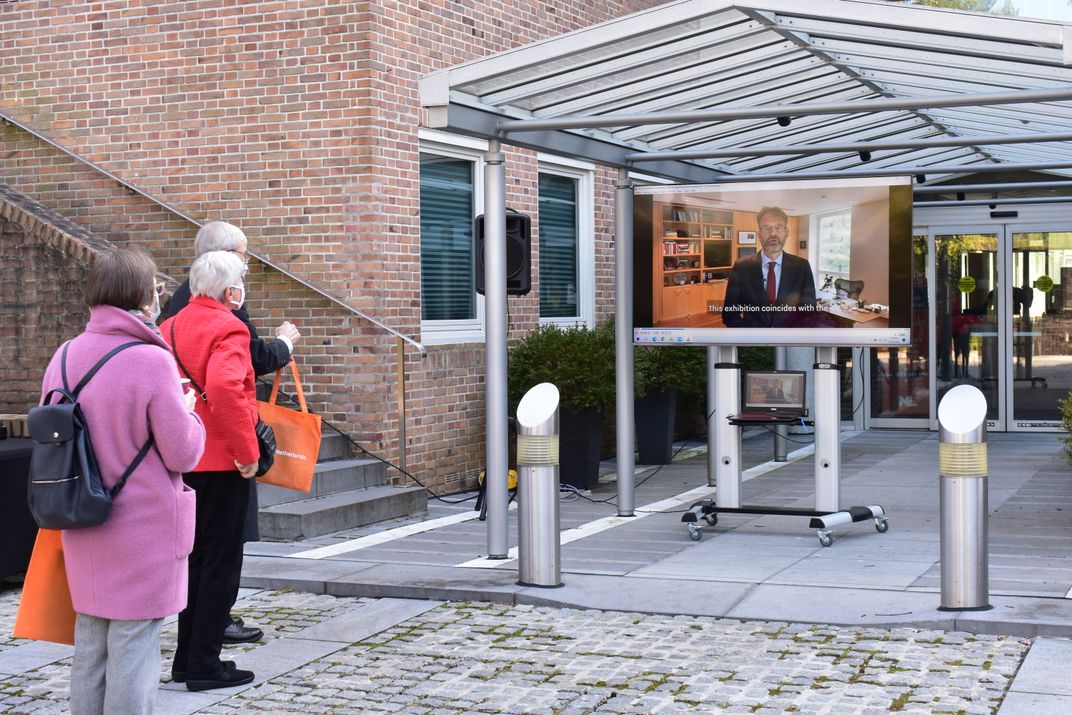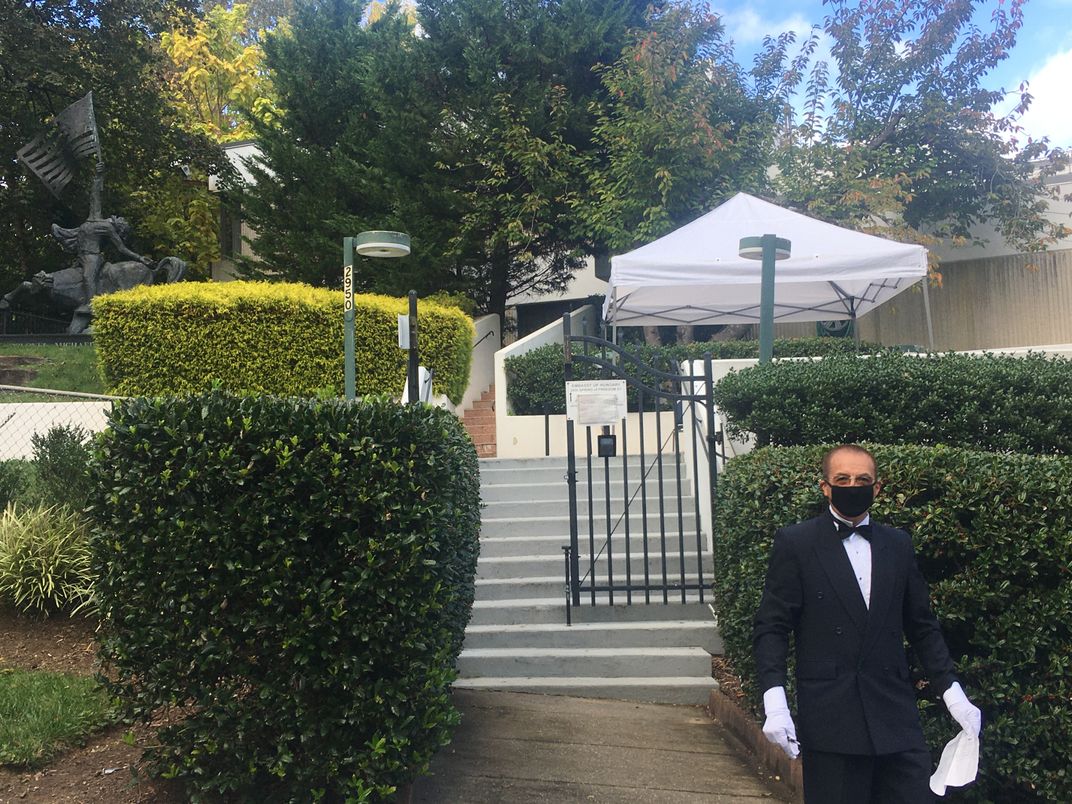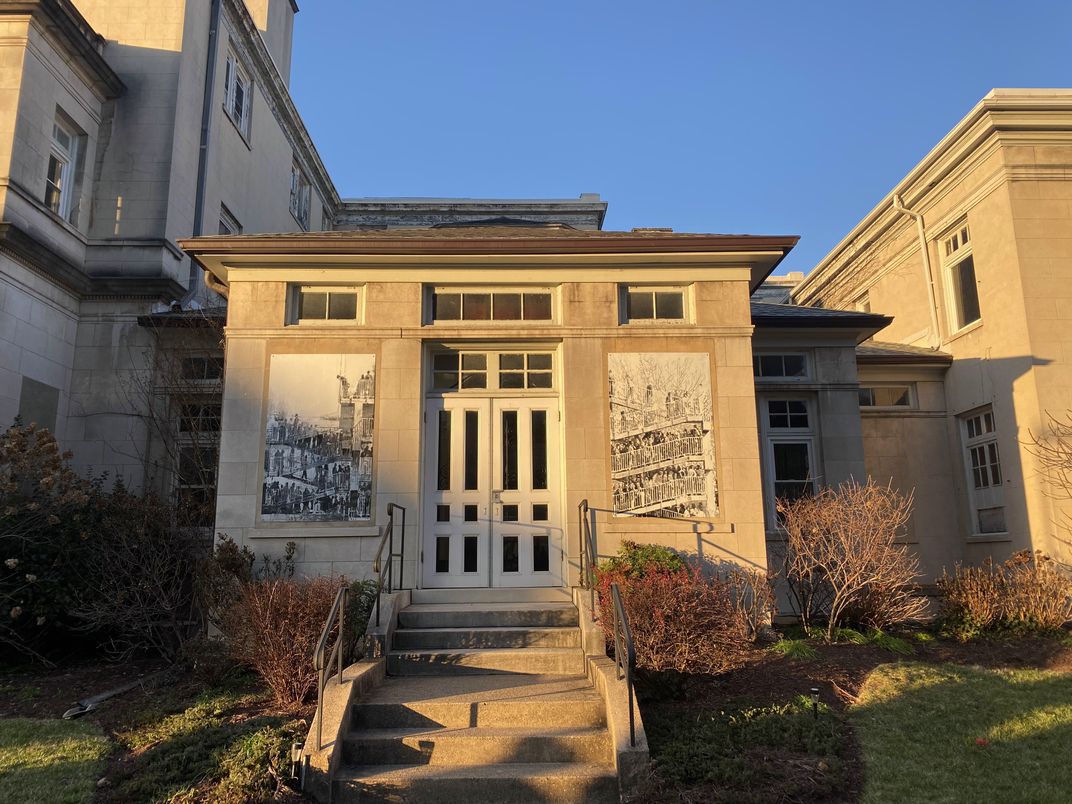Their Doors May Be Closed, but Embassies Are Still Showing People the World
From cooking demonstrations to poetry readings to special exhibitions, exploring another country has never been easier
/https://tf-cmsv2-smithsonianmag-media.s3.amazonaws.com/filer/95/a4/95a4f5eb-7954-4aca-bb01-a3f3b155ca08/photoespana_dc_main.jpg)
As museums and other cultural institutions have shuttered around the world due to the Covid-19 pandemic, so, too, have foreign embassies in Washington. Barred by local and their own country's social distancing regulations, they've been unable to host their national day celebrations, cultural events, musical performances, or just the swanky cocktail receptions that have long been the staple of diplomatic social outreach in D.C.
But without all the handshakes, and cheek kisses, embassies have gotten creative, and now, the public can enjoy much of what a country has to offer, whether in Washington or around the world.
Long before an American president made Twitter his platform of choice, foreign governments had turned to various social media platforms to engage with their diaspora. In 2012, communications professionals at various embassies formed an organization, the Digital Diplomacy coalition, to share best practices on doing just that. (During this time, I chronicled the rise of social media use by foreign leaders in a column for The Washington Diplomat.)
In the following years, the practice became widely adopted. When a typhoon struck the Philippines in 2013, the embassy in Washington created an app that would allow the diaspora to receive critical updates. The Northern Ireland Bureau, a division of the United Kingdom embassy, used Twitter to promote its ongoing peace efforts during contentious riots. In 2015, then-ambassador of Italy to the United States Claudio Bisogniero told me, “I don’t see how an ambassador can operate effectively in the 21st century without social media support.”

During the Covid-19 pandemic, however, embassies haven't just used social media and other virtual tools to complement their diplomatic efforts. The past year brought new opportunities but also a new urgency; for some embassies, engaging virtually was the only option. From online cooking demonstrations to musical performances, to the classic think tank panel, embassies are finding clever ways to engage with the public.
“Our embassy has not slowed its public diplomacy activity," says Filippo Manara, head of the press office at the Embassy of Italy. "Rather, it has quickly adapted to the new normal created by the pandemic and has fully embraced new digital tools in order to add virtual events and webinars to its digital diplomacy capabilities.”
The Embassy of Italy hosted more than 40 events in November for the World Week of Italian Cuisine, which generated more than 600,000 views. Among their plans is a series dedicated to the celebration of 160 years of bilateral relations with the U.S., to include events around music, art, technology, language, science, history, and more.
“This is an important anniversary. It is about our two countries, the friendship between our peoples, the strength of our communities, the values we share, and the inspiration we draw from each other in all fields,” says Italian Ambassador Armando Varricchio. Information for the events will be posted on the embassy's website and social media channels in coming weeks.
Irish violinist Patricia Treacy came to the Embassy yesterday and we recorded this W.B. #Yeats poem, ‘Down by the Sally Gardens’ which we dedicate to President @JoeBiden, a fan of Yeats’s work. Patricia will play the violin at today’s #inauguration. @culture_ireland pic.twitter.com/UvBb2Yas4V
— Daniel Mulhall (@DanMulhall) January 20, 2021
When Washington D.C.'s annual St. Patrick's Day parade was canceled this past March, Ambassador Daniel Mulhall of Ireland began posting a poem by an Irish writer daily on his Twitter feed, even, on occasion, reading them by the fire in his residence. For an Irish festival in Milwaukee, he gave a virtual tour of the embassy. The Irish Embassy also partnered with D.C.'s popular Politics and Prose bookstore for a Dublin Voices series on Irish literature, and hosted workshops around the world promoting Irish arts. The embassy has also had to rethink longstanding events to make them fit for a virtual reality, including its annual celebration of the work of James Joyce.
“Each year, I hold a Bloomsday celebration [a commemoration of the Irish writer that takes place on June 16, the very day in 1904 depicted in his novel Ulysses] in the garden at the embassy with readings from different people, some live music, and 100 people attending, maybe 150,” says Mulhall from his ambassador's residence in Washington. “We did it online this year, and we were able to get actors from Dublin, from Sligo, and elsewhere. We had people attending from all over the United States, with maybe 1,000 people in our virtual event.”
The Irish Foreign Ministry also put out a Bloomsday video featuring performers around the world that’s seen more than 47,000 views on YouTube.
“I'm thinking next year, I'll do a hybrid event,” Mulhall says. “We'll do it live, but also record it and put it on our YouTube channel.”

Ireland's wasn't the only embassy reconfiguring its traditions. The Embassy of Switzerland hosts an annual reception each September at the Swiss Ambassador's residence, showcasing Swiss innovation, bilateral relations and rich cuisine. This year, the event was held virtually in October, with a welcome video greeting, pre-recorded Q&A sessions with speakers, a networking chat room and online games. (Sadly, no chocolate.) In 2019, the Hungarian Embassy held its large National Day celebration at the Kennedy Center. In 2020, they held a virtual celebration, which included a musical performance and a film screening. The first 200 people to RSVP also were invited to pick up a gift bag of Hungarian delicacies at the embassy, delivered curbside by a white-gloved butler in a mask. The food, enough to feed a hungry couple, included töltött káposzta (stuffed cabbage), mákos bejgli (a traditional holiday poppyseed roll), and pogácsa, a small, scone-like pastry which, as the embassy's public diplomacy officer Eva Lukonits says, ...“is so Hungarian, it doesn't really have a name in English.”
In December, the Embassy of the Netherlands held its annual event celebrating the World Press Photo awards on the expansive grounds of its embassy, rather than in the enclosed exhibit space of a metro station, as it has the past several years. The Dutch Embassy has been hosting virtual, and hybrid events, following guidance from the CDC and the District's government.
“Ideally, diplomacy is done best in person, but we have pivoted,” says Dutch Ambassador André Haspels. “Diplomacy in the age of the pandemic has been challenging but this situation has sparked our creativity. We were pleased to hold the World Photo Exhibition outside and in a socially-distanced setting. Guests appreciated the opportunity to attend an embassy event in a safe manner.”

When the Mexican Cultural Institute, a division of the Mexican Embassy, was forced to temporarily close its gallery space, they did more than just post the photos online; they created a virtual gallery to mimic their physical space, and hosted a virtual opening reception and conversation with the artist, Martha Gabriela Driessen, whose work was featured, similar to the format of their in-person events. (And like most in-person exhibitions, this, too, has a closing date. “A Mexican Portrait” will only be available until February 13.) The Mexican Cultural Institute's real-life neighbor in Washington, the Cultural Office of the Embassy of Spain, is also hosting a photography exhibit, PHotoEspaña, posted on the fence surrounding its historic mansion, and a mural by Axel Void entitled “Pan y Circo” now hangs on the exterior of the building, behind the fence but visible from the street.
Nearly a year into the pandemic, embassies seem to have gotten into the rhythm of hosting online events, speaking engagements or other outreach. The Chinese embassy will be hosting a Lunar New Year celebration in February with the Smithsonian American Art Museum and Renwick Gallery, consisting of demonstrations of crafts and other traditions. American University's School of International Service (SIS) will be hosting a series of online conversations with ambassadors, including British Ambassador Karen Pierce speaking about Brexit, Austrian Ambassador Martin Weiss, Azerbaijani Ambassador Elin Suleymanov, and others. Botswana's Ambassador Onkokame Kitso Mokaila will be hosting a webinar about trade between Botswana and the U.S.
With so many people staying home, showcasing a country's cinematic accomplishments is a popular method of engaging with the public, and embassies regularly promote streaming-friendly options on their social media platforms. Finland is taking it one step further, however, and hosting an online Nordic Women in Film screening and discussion series, from February 2 until March 3. Sponsored by the Nordic Embassies in Washington and the Women in Film and Television International, the event will host five panel discussion on various themes, and Q&A sessions with the filmmakers.

Popular, too, are events designed in a series around a theme. All Swiss delegations in the U.S. are devoting the month of January to the legacy of Swiss author, playwright and painter Friedrich Dürrenmatt. The Embassy of Argentina's YouTube channel features a “Gastrodiplomacy” series with mouthwatering cooking demonstrations.
Mulhall will be partnering with many of the university Irish Studies programs in the U.S. to explore the legacy of the Irish fight for independence, which reached its peak in 1921, but isn't as well known as the Easter Rising of 1916 or the Troubles in the latter part of the 20th century. “I've decided that a lot of people may be confused about all this, so I'm organizing a series of seminars to explain the complexities of that period,” Mulhall says. “My aim is just to give people a better understanding of what happened 100 years ago in Ireland.”
For Moira Whelan, the Director of Democracy and Technology at the National Democratic Institute, a nonpartisan organization working to support and strengthen democracies worldwide, and a board member at the Digital Diplomacy Coalition, these types of online events have been a tonic to the seemingly endless pandemic-induced lockdown. She and her family have used the virtual resources provided by embassies to explore the world, from their own home, and to learn about different cultures, holiday traditions and foods.
“One of the things that has gotten us through the year is we've gone on 'trips',” Whelan says. “I picked Egypt, my daughter picked Paris, and my husband and son also picked places. We watched videos, we read books, we ate the food.”
“It's helpful to add the embassies into that conversation, because they specialize in making their countries and their culture accessible to Americans,” Whelan says. “There is a way to be able to explore the world just by going to their website and following them on social media, and learning and plotting where you want to go in the world.”
Many past events will be available online in perpetuity, and a quick search of an embassy's social media presence will provide open and free access. Upcoming events can be discovered via embassies' websites, social media channels and newsletters, when available. It also never hurts to contact the embassy directly and ask what programs are available.
“Our increased digital activity created new opportunities as it allowed us to reach a wider and bigger audience, including outside of the Beltway in all 50 states and beyond, for all of our campaigns and series of events, concerts, campaigns,” Manara says. “However, public diplomacy has also an important face-to-face element to it that can't be fully substituted by a rich calendar of virtual activities. We are looking forward to a day when face-to-face activities can be resumed.”
Planning Your Next Trip?
Explore great travel deals
Smithsonian magazine participates in affiliate link advertising programs. If you purchase an item through these links, we receive a commission.

